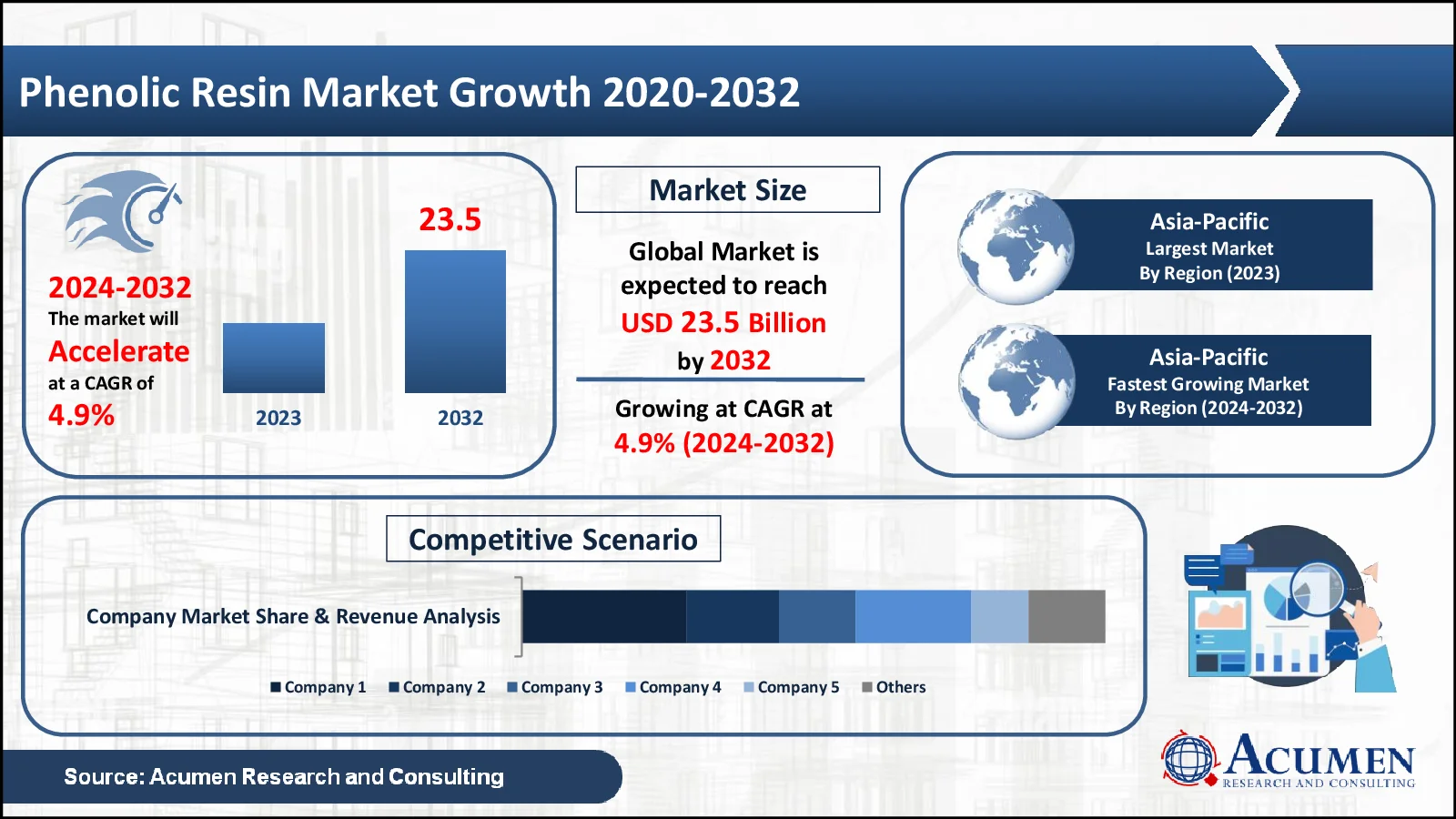Phenolic Resin Market Size to Reach USD 23.5 Billion by 2032 growing at 4.9% CAGR - Exclusive Report by Acumen Research and Consulting
The Phenolic Resin Market, valued at USD 15.4 Billion in 2023, is anticipated to surpass USD 23.5 Billion by 2032, reflecting a projected CAGR of 4.9%
The phenolic resin market is expanding rapidly, driven by its widespread use in industries such as construction, automotive, electronics, and consumer goods. Phenolic resins are highly regarded due to their superior thermal stability, flame retardancy, chemical resistance, and electrical insulation. These properties make them an ideal material for demanding situations. Furthermore, phenolic resins are widely employed in adhesives, coatings, laminates, and molding compounds, which increases their market demand.

The market is expanding as a result of increased infrastructure construction, rising automobile production, and a growing need for high-performance materials in industrial applications. However, the business confronts obstacles such as volatile raw material pricing and environmental concerns over formaldehyde emissions during manufacturing.
Opportunities in the market include the development of bio-based phenolic resins and the increased demand for lightweight materials in the aerospace and automotive industries. Technological advances to make resin formulations more sustainable and environmentally friendly are also likely to drive market expansion.
Geographically, the Asia-Pacific area dominates due to rising industrialization, increased infrastructural investments, and a strong manufacturing sector. North America and Europe are also important markets, driven by the need for sophisticated materials in the automotive and electronics industries.
Phenolic Resin Market Statistics
- The global phenolic resin market was valued at USD 15.4 billion in 2023
- The market is expected to grow at a steady annual rate of 4.9% from 2024 to 2032
- Asia-Pacific accounts for 36% of the phenolic resin market
- Asia-Pacific is growing at a CAGR of 7.3% within the phenolic resin market
- Novolac resin type generates the highest income in market
- Automotive end user have significantly contributed to revenue growth in the phenolic resin market
- Increasing adoption of eco-friendly, bio-based phenolic resins creates new prospects for engagement
Access Table Of Content: https://www.acumenresearchandconsulting.com/table-of-content/phenolic-resin-market
Phenolic Resin Market Dynamics
Rising Demand in Automotive Industry Fuels the Phenolic Resin Market
The automobile industry is a key driver of the phenolic resin market. With an increased emphasis on lightweight materials to improve fuel efficiency and minimize emissions, phenolic resins have gained popularity due to their high strength-to-weight ratio. Phenolic resins are employed in a variety of automotive applications, including brake linings, clutch facings, and insulation materials. These resins have great heat resistance, which is essential in high-temperature automotive conditions, making them indispensable in the manufacture of engine parts and heat shields.
Additionally, phenolic resins help to vehicle safety by providing greater flame retardancy, which is an important consideration in automotive design and material selection. Demand for phenolic resins is predicted to expand in tandem with global automotive production, particularly in emerging nations. The growing popularity of electric vehicles (EVs) also presents a profitable potential, since phenolic resins can improve battery and component insulation, resulting in safer and more efficient EV designs.
Growth of Bio-based Phenolic Resins Create Opportunity for Phenolic Resin Market
The growing need for sustainable materials creates considerable opportunities in the phenolic resin industry, particularly with the introduction of bio-based phenolic resins. As environmental rules tighten and industry transition to greener alternatives, bio-based resins have emerged as a possible solution to concerns about formaldehyde emissions and the environmental impact of synthetic resins.
Bio-based phenolic resins are made from renewable sources like lignin or cardanol, which reduces reliance on fossil fuels and lowers the overall carbon impact. These resins have qualities similar to traditional phenolic resins, such as heat resistance and flame retardancy, making them appropriate for a variety of applications in the automotive, construction, and electrical industries. The emergence of bio-based alternatives is consistent with the growing trend toward circular economies, in which resources are reused, repurposed, or derived from sustainable sources.
The expansion of bio-based phenolic resins could create new markets, particularly in areas where strict environmental restrictions are enforced. Companies who invest in the development of eco-friendly resin compositions are expected to gain a competitive advantage by meeting the growing demand for sustainable materials in a variety of industrial applications.
Phenolic Resin Market Segmentation
The worldwide phenolic resin market is splits into 4 segments: type, application, end user, and regional markets
- Type: novolac resin, resol resin, and others
- Application: wood adhesives, insulation, coatings, laminates, paper impregnation, foundry, molding, and others
- End User: automotive, furniture, electrical & electronics, building & construction, industrial, and others
- Regional: the Middle East & Africa, Asia-Pacific, Europe, Latin America, and North America
Phenolic Resin Market Regional Outlook
The Asia-Pacific region dominates the global phenolic resin market, owing to fast industrialization and expanding infrastructure projects in countries such as China, India, and Japan. These countries' construction industries are flourishing, creating a demand for high-performance materials like phenolic resins, which are used in adhesives, insulation, and coatings. Furthermore, increasing automotive production in this region drives up demand for phenolic resins in components such as brake pads and heat shields.
Europe follows a similar pattern, with the automobile and electronics industries being the primary users of phenolic resin. Germany, France, and the United Kingdom are significant contributors to the regional market, driven by the region's emphasis on sustainability and modern manufacturing methods. The growing trend towards electric vehicles and energy-efficient systems in Europe opens up new potential for phenolic resin makers.
Phenolic Resin Market Players
Phenolic resin companies profiled in the report include Sumitomo Bakelite Co., Ltd., Hexion, Bostik, Inc., Arclin Inc., Kolon Industries, Inc., Hexcel Corporation, SI Group, Inc., DIC CORPORATION, Georgia-Pacific Chemicals, and KRATON CORPORATION.
Enquire Before Buying https://www.acumenresearchandconsulting.com/inquiry-before-buying/1518
Receive our personalized services and customization by clicking here https://www.acumenresearchandconsulting.com/request-customization/1518
Mr. Richard Johnson
Acumen Research and Consulting
India: +91 8983225533


